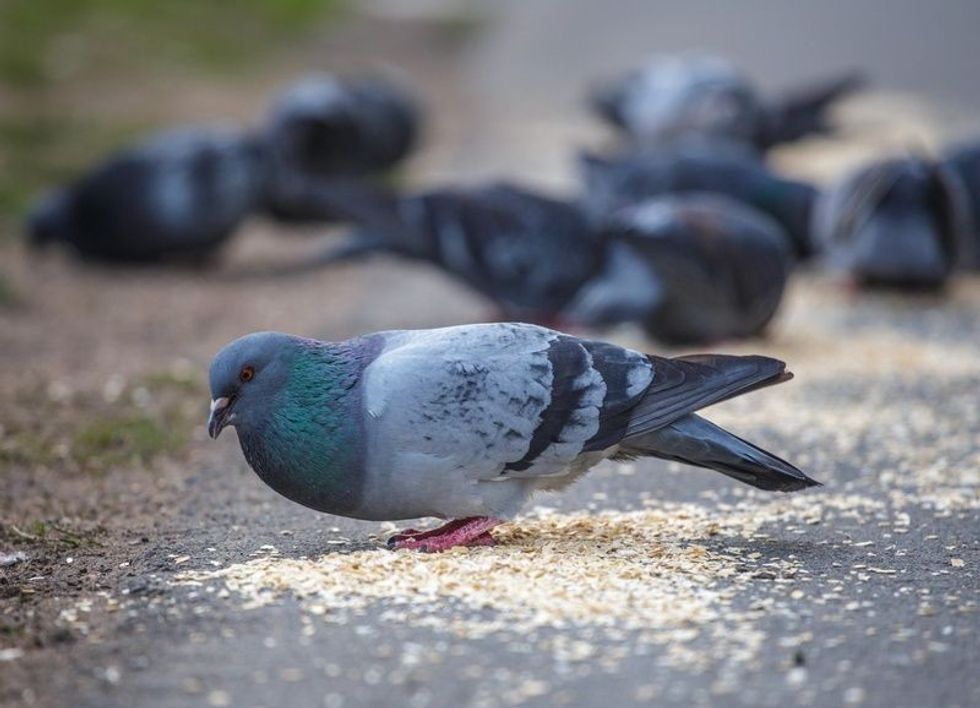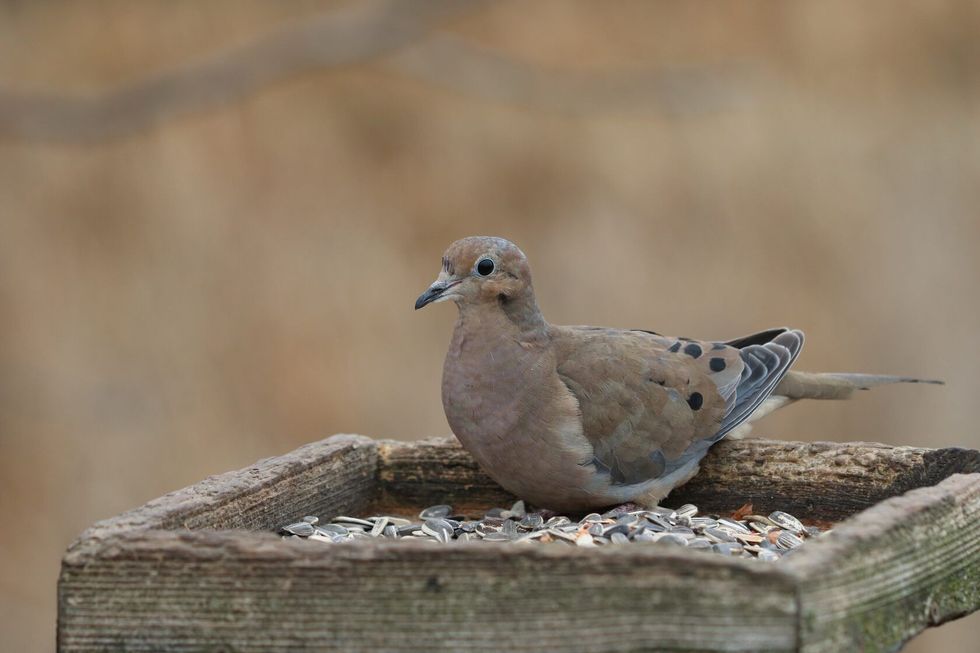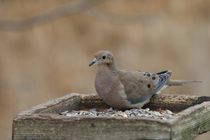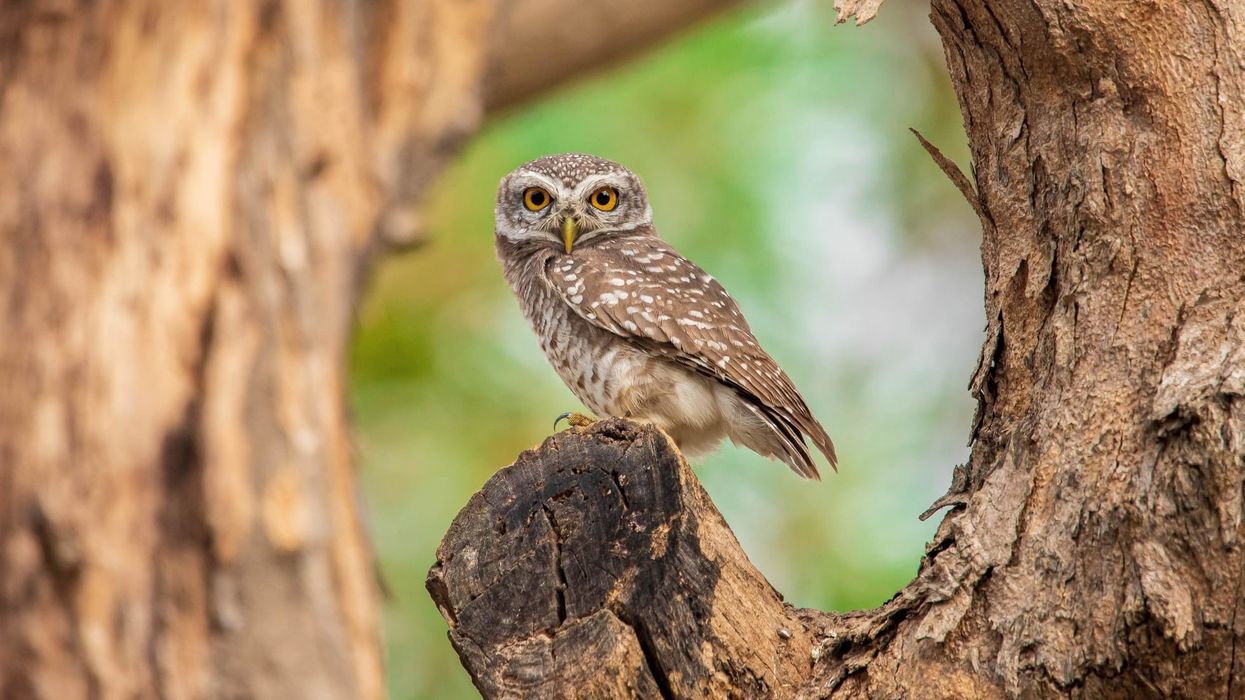Dove Food: What Should You Feed Your Feathered Friends?

Mourning doves are gorgeous and appealing birds that are popular in most backyards.
Seeing dove birds in your backyard can give you a nice, soothing, and calming sense. There are about 300 different species of doves on the globe.
Doves are affectionate and amorous, and many individuals have attracted them as year-round visitors to their homes.
Mourning dove populations dropped by roughly 15% between 1966-2015, according to the North American Breeding Bird Survey. Doves are abundant across the continent and have generally thrived as people populated the area.
Pigeons and doves have a lot of similarities in appearance. Wild doves are roughly 12 in (30.48 cm) long and a little leaner than pigeons. Mourning doves have distinct coloration, a slimmer gray-brown body, and a gray patch on the bird's head.
These birds have black spots on their wings and a single black mark behind and beneath their eyes. A long tapering tail is visible while perching. The shape and color of a dovetail in flight are white-edged.
Food including cracked corn, cereals, oat, wheat, barley, rye, peas, pulse, vetch, and seed mix makes an ideal diet for mourning doves.
What is the best food for doves?
Mourning doves are seed eaters rather than insect eaters.
These birds can and do eat weed seeds, which is great for gardeners, farmers, and anyone who lives near overgrown vacant lots. They do, however, enjoy corn.
These doves have evolved to forage on the ground, ingesting up to 20% of their body weight in seeds every day. Wild grasses, grains, and ragweed are a few of their favorite foods, though they may consume larger seeds like sunflower seeds, broken corn, and shelled peanuts if they are in a bind.
Wheat, millet, corn, sunflower, and milo are some of the seeds and grains that doves eat naturally. However, pet doves should not consume just grains because this might cause calcium deficiencies in the long run.
Seeds should make up no more than 50-60% of their total diet. In today's market, you can discover formulated seed pigeon and dove food that is widely available.
It contains not only seeds but also vegetables, as well as a variety of nutrients and vitamins. These tailored feeds come in a variety of flavors to suit the needs of breeding, resting, and performance doves.
Kaytee Supreme dove bird food is a nutritious blend that contains all of the natural protein, fiber, fats, and nutrients found in whole grains. Supreme uses natural seeds, grains, and pellets to create a simple yet healthy meal for your bird.
The products of Kaytee Supreme are fortified to ensure a balanced blend. Kaytee Supreme provides pet birds with high-quality ingredients as well as the nutrition they require.
Some of the most beneficial food for mourning doves are listed down below-
Oats - Your doves may not like the flavor, but oats are healthy for their feathers and are recommended in modest amounts. For the pigeons to survive the winter, oat supplies essential nutrients. It also benefits their circulatory and nervous systems. Keep a modest amount on hand for pigeons who are laying eggs.
Cereals are one of the greatest edible substances for pigeons and doves, and they should make up the majority of their diet. When it comes to rearing children, they are essential for growth.
Cereals are high in carbs, 8-12 % protein, 3-8 % fat, and 2-4 % minerals, making them ideal for doves. Cereals are rich in vitamins B and E, but they lack vitamin A.
Wheat is well-liked by pigeons and doves, although it must be given in smaller amounts than other foods. Doves can get fat and have issues as a result of the high carbohydrate content. Reduce the amount of wheat in the dove's diet.
Corn is also a popular food for doves and can be fed on a daily basis. Cracked corn has a high energy content, making it ideal for raising young birds.
The food is heavy in proteins and carbohydrates, making it easier to digest for the doves. Corn has a high caloric value, therefore don't feed it to the doves in excess. This lowers the likelihood of overweight birds.
During the cold season, barley, just like oat, is a suggested element in the dove diet. Barley, on the other hand, is only for adult birds because it is difficult for young birds to digest and might be damaging to them.
For adult doves, barley can help relax the digestive system and minimize diarrhea. In the coldest months of the year, such as January and February, a moderate dose is recommended.
Rye is a supplementary ingredient that contains fewer nutrients. It's good to feed your doves a small amount of rye but blending it in with more healthy elements like corns, wheat, and oats is required.
Vetch has a unique characteristic that helps doves' nervous systems. It can be used as a supplement to your birds' diet, but don't use more than 15% of the total serving. Vetch is not advised for young doves, and it should be introduced to adult doves gradually.
Peas - Peas are a nutrient-dense food that contains protein, minerals, and lipids. It's easy to digest and provides your birds with a variety of health benefits.
It's suitable for both young and adult doves. Consumption of peas reduces weariness, strengthens the immune system, and encourages healthy growth in young pigeons. The recommended serving is 20% of your bird's diet.
What can I feed wild doves?
Feeding wild birds and doves can help them survive the winter months when other food sources are short.
During the spring and summer, you are assisting birds in having easy access to food in order to feed their young. Feeding wild birds does not have to be expensive.
All you need are a couple of feeders and some inexpensive birdseed. Mourning doves require platform or tray feeders because of their greater size. They also like to eat from the ground, as long as it's generally free of seed husks.
Doves and pigeons are mostly granivorous, while some of them, especially those found in tropical locations, are also frugivorous. Doves prefer sunflower seeds, millet, milo, cracked corn, and wheat, so providing a variety of grains and seeds is a surefire way to draw them in.
Halve oranges and apples and hang them from a nail or a spike where birds can get them. Other fruits to leave out for sparrows, robins, warblers, bluebirds, woodpeckers and other birds include berries, melons, and bananas.
Make sure you don't feed them too many grapes or raisins. If consumed in high numbers, these fruits can be harmful to some birds.

What will doves not eat?
Mourning doves are seed eaters who prefer to eat from the ground rather than from bird feeders. They like the corn, millet, and milo in commercial birdseed, but they don't like several other types of seeds.
The black-striped sunflower seeds aren't much liked by dove birds. Oil or oilseed sunflower seeds and black-striped or confectionary sunflower seeds are the two types of sunflower seeds usually found in birdseed.
According to the Virginia Cooperative Extension, mourning doves often reject the black-striped version. On the other hand, all of the husks on oil-type sunflower seeds are black. The seed has a far higher fat content than black-striped sunflowers, and the shells are easier for a dove to crack.
Most birds, including mourning doves, do not eat flax seeds. Flax seeds are little, pale gold or tan that are flat, oval, or tear-drop shaped. Flaxseed is only eaten by a few bird species.
Some wild birds, such as the brown-headed cowbird and the house sparrow, consume canary seed while mourning doves normally disregard it. Canary seed is small, flat, and almond-shaped.
It's so small that the mourning doves don't even notice it. Canary seed is a Mediterranean native, which explains why mourning doves reject it. The North American Dove just hasn't evolved to the point where it can look for or scratch for an unfamiliar seed.
How do you attract doves?
You must consider what doves eat and how to feed them if you wish to attract or keep pet doves in your backyard.
Pet doves necessitate more focused and serious efforts to keep them healthy. It's not difficult to raise doves as pets if you know how to provide them with a portion of healthy food. Mourning doves will willingly visit bird feeders, and you may simply attract them.
These birds will be regular visitors if you place pigeon and dove seeds on the platform. Dove bird seed offers the best value because you do not need to pay for wastage.
Millet and cracked maize are among their favorites. If this food is offered, pigeons and possibly other birds will flock to the area.
This diet is also suitable for doves kept as pets. Water is essential for all birds, and doves will travel large distances to visit their favorite drinking places.
Even though these are larger birds, they enjoy shallow pools, streams, or even puddles, especially if the edges are tapered, giving them plenty of room to approach the water. Sprinklers or regular puddles might assist provide a sufficient water source for doves and in turn help in attracting them.
Most wildlife facilities claim that determining what doves eat and providing them with an ideal diet is simple. Mourning doves eat a range of seeds, greens, and fruits in their natural habitat. Doves may also consume fine sands or gravel to help maintain their digestive system, depending on the species.
When doves are unable to locate conventional food sources in the wild, they may eat snails, earthworms, and insects. Mourning doves, on the other hand, are vegetarians and rarely eat insects in the wild.
In the aviary, your pet doves would not generally consume such items. Platform feeders are perfect for feeding pigeons and doves. You must provide a balanced diet for these birds at all times.
Furthermore, allow the seeds to flow on the ground beneath feeders or create a ground feeding area, but maintain it free of hulls and feces that could transmit diseases. Provide a dusting or sunning place for doves, such as a broad deck railing or a bare patch of ground in a secure, peaceful spot.
Feeding Pigeons And Doves
Birds, like any other animal, require a balanced diet of carbohydrates, proteins, fats, vitamins, minerals, and water. Birds of various species require a variety of diets.
However, doves and pigeons have quite similar feeding patterns. Doves and pigeons are mostly non-migratory year-round residents across much of their habitat.
Cracked maize, white millet, oil sunflower, and bark butter are some of the dove's favorite foods.
Pigeons have typically been fed a diet consisting entirely of seeds. Seed mixes for pigeons sold commercially may comprise two to five different types of seeds.
The seeds, on the other hand, tend to be high-fat and nutrient-deficient and are not the same as those eaten by wild pigeons. Calcium, vitamin A, and other minerals are also lacking in seeds.
These mixes are very nutritious and are frequently fed as the sole source of nutrients, resulting in poor nutrition and possibly a shorter lifetime. Seeds can be an ideal part of a pigeon's diet.
Pigeon diets that include some seeds and cereal are available. Some contain brewer's yeast, as well as vitamins and minerals.
For performance, resting, and breeding birds, different diet formulas are available. The difficulty with feeding pigeons and doves' diets based on seeds is that they will just eat the seeds and will not benefit from the nutritional benefits of the pellets.
Ethics Of Feeding Pigeons
Safflower is found in high-quality pigeon feed. Grit and oyster shells are mixed in. Feed stores, rather than pet stores, are where you'll find them.
For doves, the usage of dietary foundation seed is recommended. Dove food mixtures are available in pet stores and are suitable for pigeons as well.
Pigeons and doves thrive when they are well-fed, which means they are given a perfect-sized piece of fresh food in the morning and must finish it all before sundown. The next morning, more fresh food is delivered.
Birds that are relatively young, stressed, wounded, hatching, or raising young ones may have certain particular requirements. For pigeons with specialized dietary needs, specially prepared pelleted feeds are available. In these cases, you should seek advice from your veterinarian.
A veterinarian can assist you in determining your bird's nutritional needs. In general, those who eat pellets as their primary source of nutrients do not require supplements. At different points in a bird's life, certain vitamins or minerals may be more necessary. If your bird is found to be lacking in calcium, supplements are available.
When it comes to pet birds, proper diet is often overlooked, despite the fact that it is crucial. Many health issues in birds are a result of poor nutrition.
The health of birds is determined by how well they are fed, so it is critical that bird owners understand what to feed their birds. To stay current on their birds' dietary needs, bird owners should keep in touch with their vets.
We Want Your Photos!
More for You
See All
Bachelor of Science specializing in Microbiology

Oluwatosin MichaelBachelor of Science specializing in Microbiology
With a Bachelor's in Microbiology from the Federal University of Agriculture, Abeokuta, Ogun State, Oluwatosin has honed his skills as an SEO content writer, editor, and growth manager. He has written articles, conducted extensive research, and optimized content for search engines. His expertise extends to leading link-building efforts and revising onboarding strategies.
Disclaimer
1) Kidadl is independent and to make our service free to you the reader we are supported by advertising. We hope you love our recommendations for products and services! What we suggest is selected independently by the Kidadl team. If you purchase using the Buy Now button we may earn a small commission. This does not influence our choices. Prices are correct and items are available at the time the article was published but we cannot guarantee that on the time of reading. Please note that Kidadl is a participant in the Amazon Services LLC Associates Program, an affiliate advertising program designed to provide a means for sites to earn advertising fees by advertising and linking to Amazon. We also link to other websites, but are not responsible for their content.
2) At Kidadl, we strive to recommend the very best activities and events. We will always aim to give you accurate information at the date of publication - however, information does change, so it’s important you do your own research, double-check and make the decision that is right for your family. We recognise that not all activities and ideas are appropriate for all children and families or in all circumstances. Our recommended activities are based on age but these are a guide. We recommend that these ideas are used as inspiration, that ideas are undertaken with appropriate adult supervision, and that each adult uses their own discretion and knowledge of their children to consider the safety and suitability. Kidadl cannot accept liability for the execution of these ideas, and parental supervision is advised at all times, as safety is paramount. Anyone using the information provided by Kidadl does so at their own risk and we can not accept liability if things go wrong.
3) Because we are an educational resource, we have quotes and facts about a range of historical and modern figures. We do not endorse the actions of or rhetoric of all the people included in these collections, but we think they are important for growing minds to learn about under the guidance of parents or guardians.







